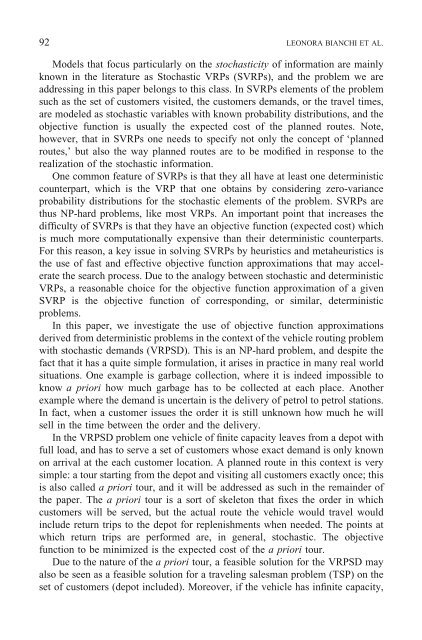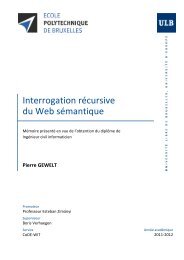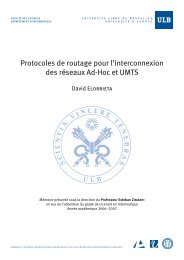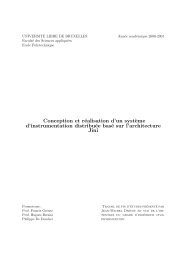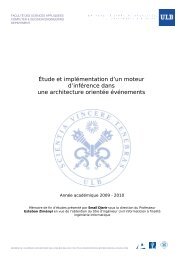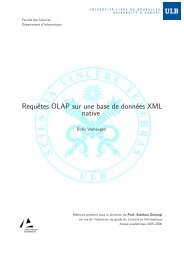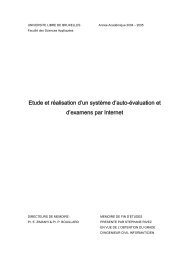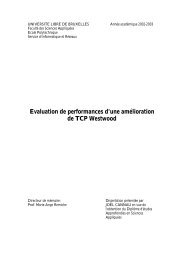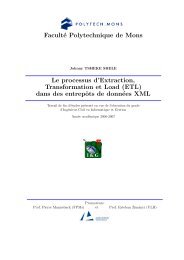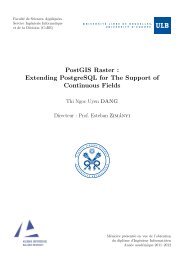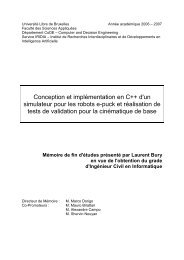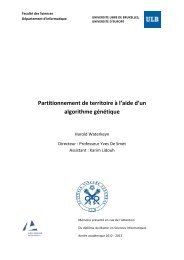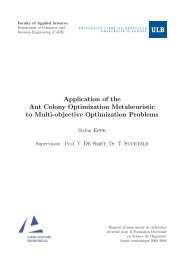Hybrid Metaheuristics for the Vehicle Routing Problem with ...
Hybrid Metaheuristics for the Vehicle Routing Problem with ...
Hybrid Metaheuristics for the Vehicle Routing Problem with ...
You also want an ePaper? Increase the reach of your titles
YUMPU automatically turns print PDFs into web optimized ePapers that Google loves.
92 LEONORA BIANCHI ET AL.<br />
Models that focus particularly on <strong>the</strong> stochasticity of in<strong>for</strong>mation are mainly<br />
known in <strong>the</strong> literature as Stochastic VRPs (SVRPs), and <strong>the</strong> problem we are<br />
addressing in this paper belongs to this class. In SVRPs elements of <strong>the</strong> problem<br />
such as <strong>the</strong> set of customers visited, <strong>the</strong> customers demands, or <strong>the</strong> travel times,<br />
are modeled as stochastic variables <strong>with</strong> known probability distributions, and <strong>the</strong><br />
objective function is usually <strong>the</strong> expected cost of <strong>the</strong> planned routes. Note,<br />
however, that in SVRPs one needs to specify not only <strong>the</strong> concept of Fplanned<br />
routes,_ but also <strong>the</strong> way planned routes are to be modified in response to <strong>the</strong><br />
realization of <strong>the</strong> stochastic in<strong>for</strong>mation.<br />
One common feature of SVRPs is that <strong>the</strong>y all have at least one deterministic<br />
counterpart, which is <strong>the</strong> VRP that one obtains by considering zero-variance<br />
probability distributions <strong>for</strong> <strong>the</strong> stochastic elements of <strong>the</strong> problem. SVRPs are<br />
thus NP-hard problems, like most VRPs. An important point that increases <strong>the</strong><br />
difficulty of SVRPs is that <strong>the</strong>y have an objective function (expected cost) which<br />
is much more computationally expensive than <strong>the</strong>ir deterministic counterparts.<br />
For this reason, a key issue in solving SVRPs by heuristics and metaheuristics is<br />
<strong>the</strong> use of fast and effective objective function approximations that may accelerate<br />
<strong>the</strong> search process. Due to <strong>the</strong> analogy between stochastic and deterministic<br />
VRPs, a reasonable choice <strong>for</strong> <strong>the</strong> objective function approximation of a given<br />
SVRP is <strong>the</strong> objective function of corresponding, or similar, deterministic<br />
problems.<br />
In this paper, we investigate <strong>the</strong> use of objective function approximations<br />
derived from deterministic problems in <strong>the</strong> context of <strong>the</strong> vehicle routing problem<br />
<strong>with</strong> stochastic demands (VRPSD). This is an NP-hard problem, and despite <strong>the</strong><br />
fact that it has a quite simple <strong>for</strong>mulation, it arises in practice in many real world<br />
situations. One example is garbage collection, where it is indeed impossible to<br />
know a priori how much garbage has to be collected at each place. Ano<strong>the</strong>r<br />
example where <strong>the</strong> demand is uncertain is <strong>the</strong> delivery of petrol to petrol stations.<br />
In fact, when a customer issues <strong>the</strong> order it is still unknown how much he will<br />
sell in <strong>the</strong> time between <strong>the</strong> order and <strong>the</strong> delivery.<br />
In <strong>the</strong> VRPSD problem one vehicle of finite capacity leaves from a depot <strong>with</strong><br />
full load, and has to serve a set of customers whose exact demand is only known<br />
on arrival at <strong>the</strong> each customer location. A planned route in this context is very<br />
simple: a tour starting from <strong>the</strong> depot and visiting all customers exactly once; this<br />
is also called a priori tour, and it will be addressed as such in <strong>the</strong> remainder of<br />
<strong>the</strong> paper. The a priori tour is a sort of skeleton that fixes <strong>the</strong> order in which<br />
customers will be served, but <strong>the</strong> actual route <strong>the</strong> vehicle would travel would<br />
include return trips to <strong>the</strong> depot <strong>for</strong> replenishments when needed. The points at<br />
which return trips are per<strong>for</strong>med are, in general, stochastic. The objective<br />
function to be minimized is <strong>the</strong> expected cost of <strong>the</strong> a priori tour.<br />
Due to <strong>the</strong> nature of <strong>the</strong> a priori tour, a feasible solution <strong>for</strong> <strong>the</strong> VRPSD may<br />
also be seen as a feasible solution <strong>for</strong> a traveling salesman problem (TSP) on <strong>the</strong><br />
set of customers (depot included). Moreover, if <strong>the</strong> vehicle has infinite capacity,


